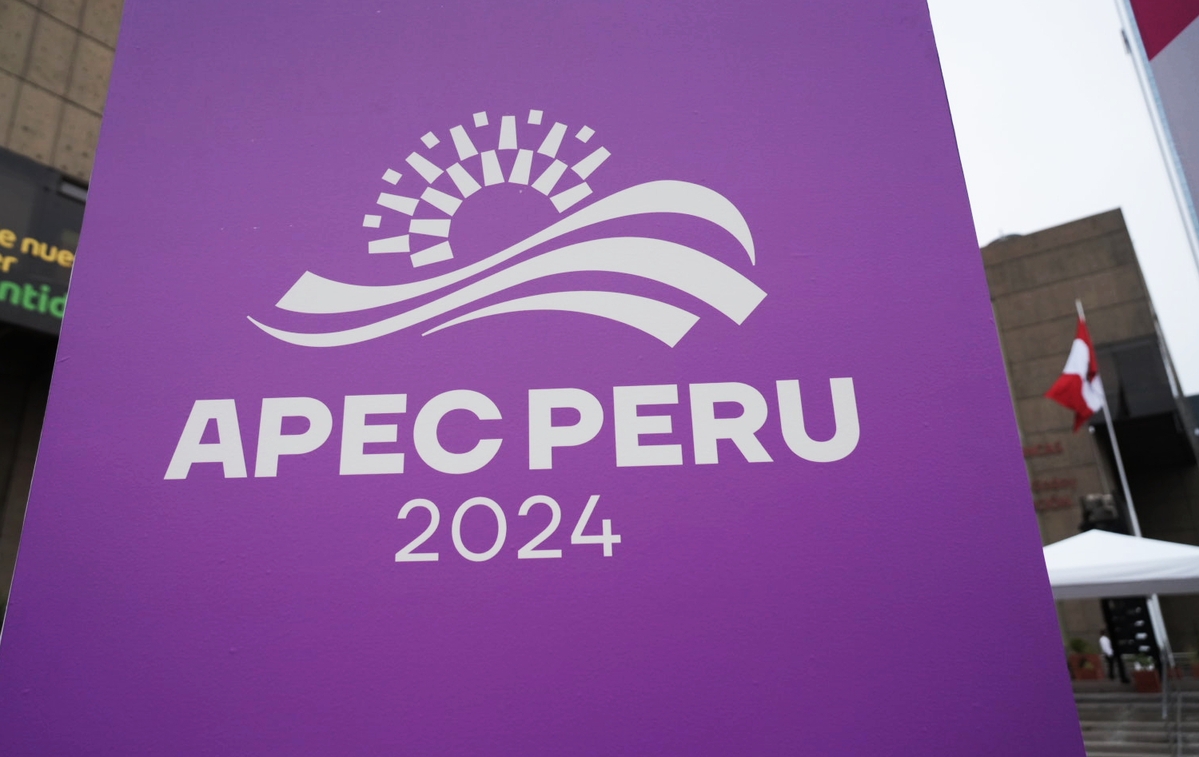Source:China Daily 2024-11-16

This photo shows the logo of the Asia-Pacific Economic Cooperation (APEC) 2024 meeting in Lima, Peru, Nov 8, 2024. [Photo/Xinhua]
APEC has become an increasingly valuable platform for fostering international cooperation and promoting trade liberalization, experts said.
"I think APEC is a very valuable institution, and it has become even more valuable over the last five to 10 years as the US and some countries have kind of shrunk from trade liberalization," Sourabh Gupta, a senior fellow at the Washington-based Institute for China-American Studies, told China Daily.
APEC, or Asia-Pacific Economic Cooperation, was established in 1989 to promote free trade throughout the region. Unlike binding treaties enforced by other multilateral organizations, APEC operates on a nonbinding basis, relying on consensus and voluntary commitments.
Gupta described APEC as a "very diverse body" with members of Latin American, Global South and Asia-Pacific economies. He also said that APEC "is created in a very pragmatic framework", allowing it to prosper over the last few years.
APEC still has a lot of value in bringing member economies together on an open, nondiscriminatory platform and trying to further liberalize trade, Gupta said.
"APEC has a real role to play in international politics at a time when international politics is fragmenting on a block basis and when protectionism and populism are still in the air," Gupta said.
"APEC does a great job in terms of trying to provide that platform on which they can still come together and take pragmatic steps toward trade and investment cooperation."
Cynthia Sanborn, director of the Center for China and Asia-Pacific Studies at Universidad del Pacifico in Lima, Peru, told China Daily, "APEC was born as a framework for promoting globalization, free trade and open markets."
Sanborn said that some APEC member economies have no longer been pursuing global initiatives, with protectionism rising in many places.
"It (APEC) remains a framework of the best intentions in that direction, a way to hold on to the idea of a global shared economy, and that trade is a peaceful activity that should be pursued," she said.
This year's APEC leaders' meeting carries the theme "People, Business, Prosperity". The key agenda items are expected to include strengthening regional economic integration, promoting digital trade, enhancing supply chain resilience and addressing climate change.
Sanborn said the APEC meeting would highlight Latin America to the rest of the world and benefit Peru, especially its exporters. She said small — and medium-sized enterprises expect much from sectors other than minerals trade.
"We don't need a lot of trade activity to sell copper and iron. I mean, we sell minerals; we're known for that," Sanborn said. "But we have a lot of other innovative sectors. And so, it's showing the world what else Peru can do. It's showing Peru as a tourist site."
She mentioned the newly inaugurated Chancay Port. The natural deep-water port, which can dock the world's largest cargo ships, could greatly reduce the transportation time and logistics cost of goods exported from South America to the Asian market.
Peru has hosted previous APEC leaders' meetings.
"It's the third time Peru has become the host of the event and the president of APEC," Leolino Dourado, a researcher with CIUP said, adding few member economies have done that. "In Latin America, we're the only one."
When Peru hosted APEC in 2008 and 2016, significant progress in areas such as trade facilitation and investment liberalization was made.
According to the homepage of APEC Peru 2024, the Andean nation seeks to further advance APEC's agenda by emphasizing the social dimension of economic growth and promoting policies that benefit all segments of society.
Copyright © Xizang Daily & China Xizang News All rights reserved
Reproduction in whole or in part without permissions prohibited
Index Code: 藏 ICP 备 05000021 号
Producer: Xizang Daily International Communication Center